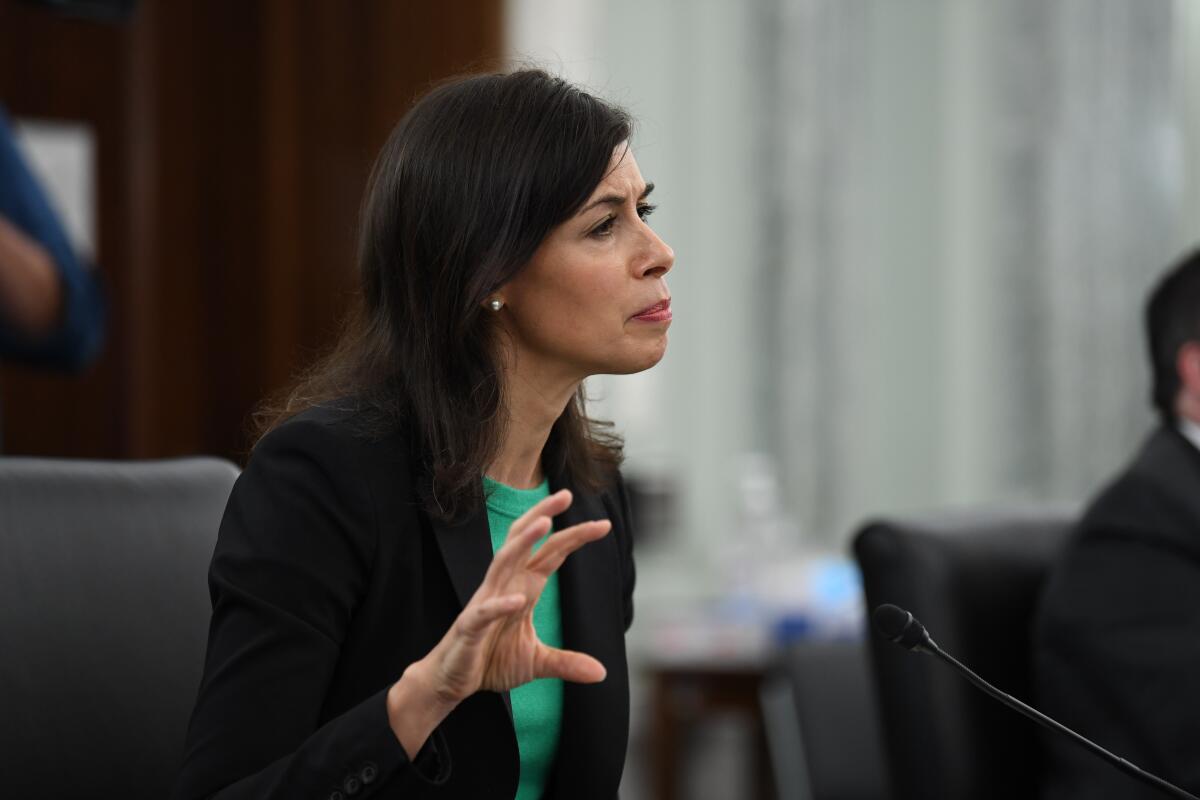A federal appeals court on Thursday dealt a blow to President Biden’s Federal Communications Commission, striking down the agency’s hard-fought and long-debated open internet rules.
The FCC had sought to reinstate a sweeping policy established under President Obama that was designed to treat internet service as an essential public service, similar to a water or power utility.
Under the so-called net neutrality rules, internet service providers would have been subjected to greater regulation. A Republican-led commission repealed the rules in 2017 during President-elect Donald Trump’s first term.
Early last year, the FCC — then back under Democrat control — voted to formalize a national standard for internet service to prevent the blocking or slowing of information delivered over broadband internet lines. The core principle of open internet meant that internet service providers couldn’t discriminate among content suppliers.
The order also would have given the FCC increased oversight to demand that internet providers respond to service outages or security breaches involving consumers’ data. The FCC cited national security, saying increased oversight was necessary for the commission to effectively crack down on foreign-owned companies that were deemed to be security threats.
But on Thursday, the 6th U.S. Circuit Court of Appeals, based in Cincinnati, ruled that the five-member commission lacked the authority to reclassify broadband internet as a telecommunications service. The decision dismantles one of Biden’s major technology initiatives.
In its ruling, the 6th Circuit referred to the FCC’s net neutrality order as a “heavy-handed regulatory regime.”
The court said a recent U.S. Supreme Court ruling had removed a judicial framework that allowed courts to interpret rules with deference to the federal agency that created them. The 6th Circuit said the FCC did not have the statutory authority to change the classification of broadband internet to a telecommunications service. That role rests with Congress.
The case was brought by the Ohio Telecom Assn., a trade organization representing internet service providers.
FCC Chair Jessica Rosenworcel, who has long championed the net neutrality rules, called on lawmakers to take up the mantle in the wake of the court decision. She had shepherded the move to reinstate them during her tenure leading the agency and led the 3-2 party-line vote last year to restore the net neutrality rules.
“Consumers across the country have told us again and again that they want an internet that is fast, open, and fair,” Rosenworcel said in a statement. “With this decision it is clear that Congress now needs to heed their call, take up the charge for net neutrality, and put open internet principles in federal law.”
FCC Chair Jessica Rosenworcel speaks during a Senate committee hearing to examine the agency in 2020.
(Jonathan Newton / Pool Photo)
The regulatory climate has changed dramatically in recent years and is expected to shift again after Trump moves back into the White House. Trump’s pick for FCC chairman, Brendan Carr, wrote a chapter on the FCC in the conservative policy blueprint Project 2025. Companies expect the commission under Carr to be more business-friendly.
“President Biden’s entire plan rested on the Chicken Little tactic of persuading Americans that the Internet would break in the absence of these so-called ‘net neutrality’ regulations,” Carr said in a statement. “The American people have now seen through that ruse.”
The net neutrality dispute hinged on the degree to which the FCC could regulate broadband internet service providers under the authority the commission received from Congress in the landmark Communications Act of 1934 and the Telecommunications Act of 1996.
“We hold that Broadband Internet Service Providers offer only an ‘information service’ … and therefore, the FCC lacks the statutory authority to impose its desired net-neutrality policies through the ‘telecommunications service’ provision of the Communications Act,” the 6th Circuit judges wrote in their 26-page ruling.
Consumer groups, which lobbied for more than a decade for net neutrality regulations, lamented the decision.
“Today’s decision represents a major setback for consumers, competition, and the Open Internet,” John Bergmayer, legal director at Public Knowledge, said in a statement.
“In rejecting the FCC’s authority to classify broadband as a telecommunications service, the court has ignored decades of precedent and fundamentally misunderstood both the technical realities of how broadband works and Congress’ clear intent in the Communications Act.”
Net neutrality has been a seesaw battle for more than 15 years.
In the early days of broadband penetration, major companies lined up on opposing sides. Google, Netflix and other tech companies joined with consumer groups calling for net neutrality rules to level the playing field with internet service providers such as AT&T, Verizon, Comcast Corp. or Charter Communications.
Supporters of net neutrality wanted those providers to be regulated under Title II of the landmark communications act, which would have given the FCC a greater enforcement role.
“Recall that the market’s initial concern over Title II reclassification never had anything at all to do with net neutrality,” cable analyst Craig Moffett wrote in a note to investors. Instead, investors in telecommunications stocks were worried that such reclassification would open a door “to broadband price regulation,” Moffett wrote.
But that didn’t happen.
“That risk is now put to bed,” Moffett wrote.
